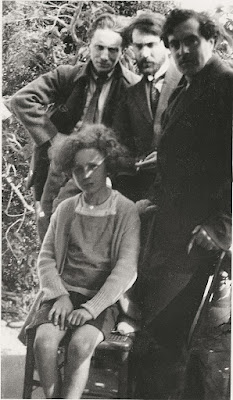Satansbraten by Fassbinder
Satansbraten Satan´s Brew (1976), dir Rainer Werner Faßbinder, starring Kurt Raab
The Arsenal cinema, Berlin, is running a Faßbinder retrospective in tandem with a look back at the films of Roberto Rossellini.The season was kick started with this rare comedy from Faßbinder, known mainly for more portentous works like Die Ehe der Maria Braun (The Marriage of Maria Braun) and Die Bitteren Tränen der Petra von Kant (The BitterTears of Petra von Kant). In some ways the film resembles conventional sex comedies of the era, the most obvious slapstick, bums ´n tits, the usual slap´n tickle end of the pier fare, something we´re entirely accustomed to in Britain. In fact the film is unusual for a German or continental director because it resembles Anglo-Saxon tastes in cinematic populism, rather than the continental drive towards opera or portentousness.
Walter Kranz, an Über-heterosexual writer, fantasises that he is the gay nineteenth-century poet Stephan George. He lives with his mad brother Ernst and shrewish wife Luisa. Walter fornicates with a variety of mistresses, always having to restrain Ernst who is excluded from Walter´s libidinal economy. Instead Ernst manages to sublimate his inclinations by torturing his vast collection of houseflies. Luisa is a brash West German housewife, who must regard her husband as a lunatic. Walter is infatuated with Stephan George, even initiating a gay encounter in a toilet only to vomit when asked for the obvious. He hires a variety of young dandies to sit around, listening to his reading of George´s work, dressed in tired Victorian costume with peeling face makeup. He hires a stud to pose beside him as a nude Greek athelete, in order to complete the aura of neo-classicism. The film might be called a post-modern satire but is hardly that knowing in its unbounded craziness. In fact it is often daft, incoherent, nonsensical, whimsical, yet somehow doesn´t work in the way that Python or other daftness does. This incoherence is so stark that the film might be described as schizophrenic in it´s engagement (or disengagement) with the character Walter Kranz, entirely unsure of whether it wants to be serious or not.
Unsure how to deal with Walter, his mistresses, his wife, his crazy brother and with the entire Gay theme that seems to stutter somewhat throughout. The film might be called misogynistic and homophobic because it doesn´t succeed or perhaps even attempt to undermine the cliches it sets out to. At the end of the film the viewer still realises that poets exist, can be great, rarified and dignified. Gay people can be discrete. Heterosexual love can be an enriching spiritual experience. We realise this but can´t figure out whether the film is great craziness or a dismal incoherence and perhaps we shouldn´t care either.
Paul Murphy, Berlin
The Arsenal cinema, Berlin, is running a Faßbinder retrospective in tandem with a look back at the films of Roberto Rossellini.The season was kick started with this rare comedy from Faßbinder, known mainly for more portentous works like Die Ehe der Maria Braun (The Marriage of Maria Braun) and Die Bitteren Tränen der Petra von Kant (The BitterTears of Petra von Kant). In some ways the film resembles conventional sex comedies of the era, the most obvious slapstick, bums ´n tits, the usual slap´n tickle end of the pier fare, something we´re entirely accustomed to in Britain. In fact the film is unusual for a German or continental director because it resembles Anglo-Saxon tastes in cinematic populism, rather than the continental drive towards opera or portentousness.
Walter Kranz, an Über-heterosexual writer, fantasises that he is the gay nineteenth-century poet Stephan George. He lives with his mad brother Ernst and shrewish wife Luisa. Walter fornicates with a variety of mistresses, always having to restrain Ernst who is excluded from Walter´s libidinal economy. Instead Ernst manages to sublimate his inclinations by torturing his vast collection of houseflies. Luisa is a brash West German housewife, who must regard her husband as a lunatic. Walter is infatuated with Stephan George, even initiating a gay encounter in a toilet only to vomit when asked for the obvious. He hires a variety of young dandies to sit around, listening to his reading of George´s work, dressed in tired Victorian costume with peeling face makeup. He hires a stud to pose beside him as a nude Greek athelete, in order to complete the aura of neo-classicism. The film might be called a post-modern satire but is hardly that knowing in its unbounded craziness. In fact it is often daft, incoherent, nonsensical, whimsical, yet somehow doesn´t work in the way that Python or other daftness does. This incoherence is so stark that the film might be described as schizophrenic in it´s engagement (or disengagement) with the character Walter Kranz, entirely unsure of whether it wants to be serious or not.
Unsure how to deal with Walter, his mistresses, his wife, his crazy brother and with the entire Gay theme that seems to stutter somewhat throughout. The film might be called misogynistic and homophobic because it doesn´t succeed or perhaps even attempt to undermine the cliches it sets out to. At the end of the film the viewer still realises that poets exist, can be great, rarified and dignified. Gay people can be discrete. Heterosexual love can be an enriching spiritual experience. We realise this but can´t figure out whether the film is great craziness or a dismal incoherence and perhaps we shouldn´t care either.
Paul Murphy, Berlin

Comments